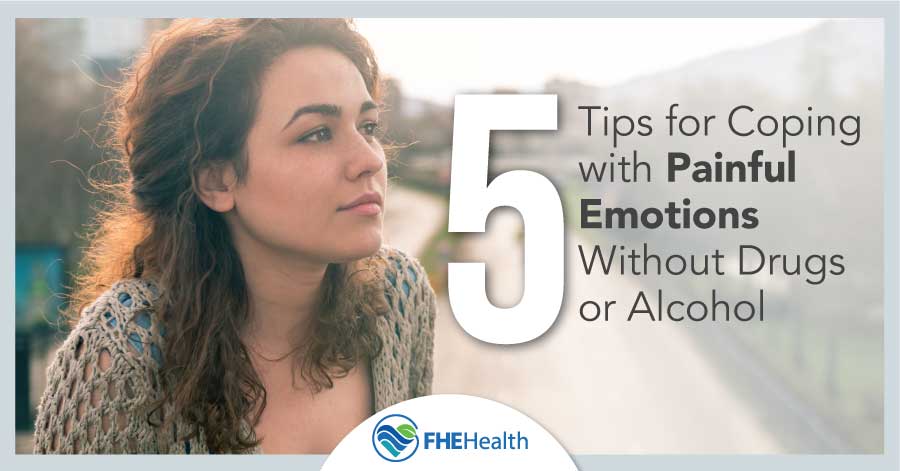
Do you find yourself reaching for a drink or taking drugs when uncomfortable emotions hit?
If so, you’re not alone. Having a glass of wine, a few beers or even a couple of tokes off a joint aren’t just common ways to deal with stress, anxiety, and depression; they’re widely viewed as being both safe and socially acceptable.
The trouble is that self-medicating to deal with stress, fear, anger or other distressing feelings at best provides only temporary relief from what’s bothering you. Alcohol and drugs can give you a short-term escape, but relying on substances when you’re overwhelmed, uncomfortable or upset does little more than create a whole other set of problems that can lead to even more guilt, shame and stress.
What Is Self-Medicating?
Simply put, self-medicating is using a substance to try to deal with something that’s painful or distressing rather than seeking help from a doctor or mental health specialist. It’s taking steps to treat your symptoms using whatever substances you have access to, whether that means drinking alcohol or using over-the-counter, prescription or street drugs.
It can also mean using prescription drugs in higher doses than what you were prescribed or for a different condition than what the drugs are meant to treat. For example, taking prescription painkillers when you feel anxious is a form of self-medication.
Why Do People Self-Medicate for Stress, Anxiety and Depression?
People self-medicate for stress, anxiety, and depression because they rarely recognize what they are doing — they don’t see their behavior as self-medicating; they simply think they’re dealing with their emotional pain in a way that’s normal and acceptable.
Another reason why many people self-medicate with alcohol and drugs is that it’s effective, at least on a temporary basis. Depression, anxiety and post-traumatic stress disorders often develop due to hyperactivity in the brain, and alcohol is a central nervous system depressant that can calm this excess brain activity for a brief period of time.
How Can I Cope Without Turning to Drugs or Alcohol?
The good news is that if you are dealing with stress, depression and anxiety, there are a number of safe, effective ways to ease your uncomfortable symptoms without turning to substances.
Here are five tips you can use to cope with painful emotions without self-medicating with alcohol or drugs.
1. Ask for Help
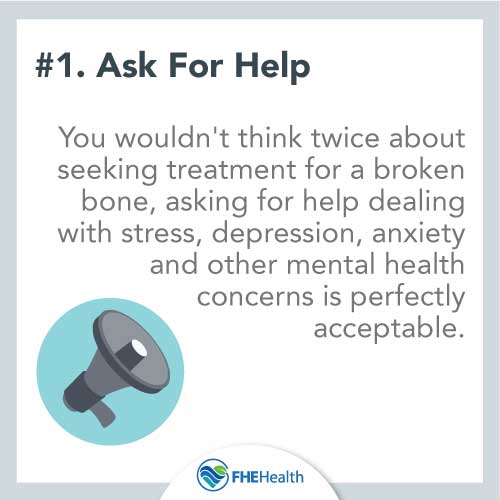 Anxiety and depression aren’t just unpleasant feelings you can drink or drug your way out of — they’re common, life-changing mental illnesses that can lead to serious complications such as substance abuse.
Anxiety and depression aren’t just unpleasant feelings you can drink or drug your way out of — they’re common, life-changing mental illnesses that can lead to serious complications such as substance abuse.
Just as you wouldn’t think twice about seeking treatment for a broken bone, asking for help dealing with stress, depression, anxiety and other mental health concerns is perfectly acceptable. Talk to your primary care provider, pastor, employee assistance counselor or trusted friend to let them know how you’re feeling and that you’ve been coping with your emotions by using drugs or alcohol.
In the past, there has been a lot of stigma around getting therapy for mental illnesses, but societal attitudes are changing. Seeking therapy is no longer viewed as a sign of weakness — it’s a sign you’re strong enough to recognize when you need a hand.
2. Start Exercising
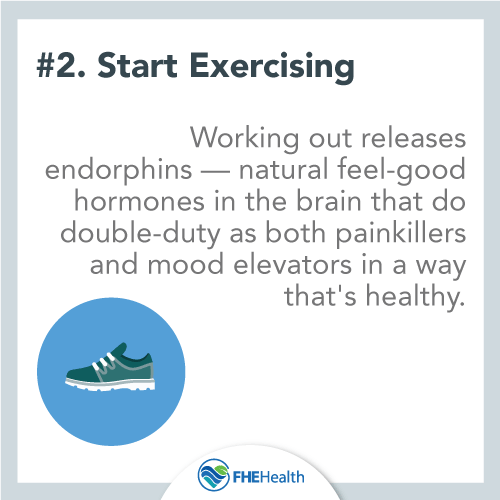 Physical activity provides a host of health benefits that go well beyond shedding weight and getting toned. Working out releases endorphins — natural feel-good hormones in the brain that do double-duty as both painkillers and mood elevators in a way that’s healthy. Exercising also helps lower levels of the stress hormones cortisol and adrenaline, which is why many people experience a “runner’s high” after a challenging workout.
Physical activity provides a host of health benefits that go well beyond shedding weight and getting toned. Working out releases endorphins — natural feel-good hormones in the brain that do double-duty as both painkillers and mood elevators in a way that’s healthy. Exercising also helps lower levels of the stress hormones cortisol and adrenaline, which is why many people experience a “runner’s high” after a challenging workout.
The good news is you don’t have to be a hardcore athlete to enjoy mental health benefits from getting active — any activity that involves moving your body, elevating your heart rate and challenging your muscles will trigger a cascade of positive biological events that are healthier, and more effective, than self-medicating to deal with stress.
3. Go for Massage Therapy
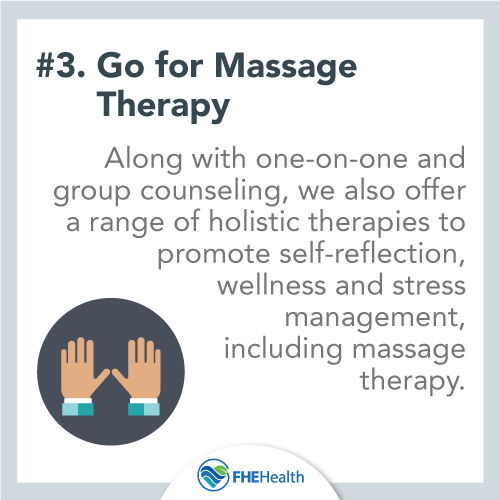 Here at FHE Health, we use a wide variety of treatment methods in our addiction and mental health treatment programs. Along with one-on-one and group counseling, we also offer a range of holistic therapies to promote self-reflection, wellness and stress management, including massage therapy.
Here at FHE Health, we use a wide variety of treatment methods in our addiction and mental health treatment programs. Along with one-on-one and group counseling, we also offer a range of holistic therapies to promote self-reflection, wellness and stress management, including massage therapy.
Like exercise, massage is known to boost levels of both dopamine and serotonin, two “feel-good” hormones that affect the body in much the same way opioids do without any dangerous side effects or risk of addiction. Massage therapy can also lower levels of the stress hormone cortisol, leaving you feeling relaxed without self-medicating with alcohol or drugs.
4. Focus on Self-Care
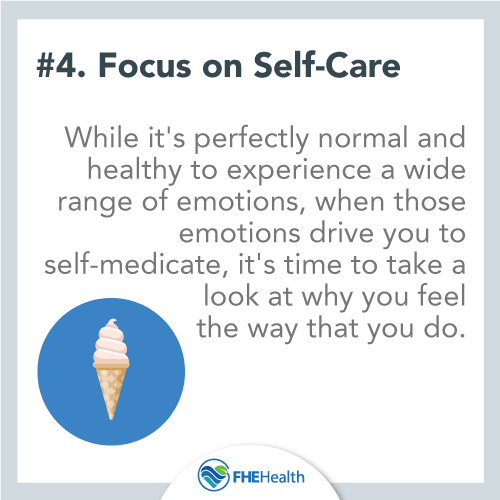 Painful emotions like guilt, sadness, anger and regret don’t just spontaneously develop — they’re rooted in traumatic experiences, long-held beliefs and persistent negative thoughts. While it’s perfectly normal and healthy to experience a wide range of emotions, when those emotions drive you to self-medicate, it’s time to take a look at why you feel the way that you do.
Painful emotions like guilt, sadness, anger and regret don’t just spontaneously develop — they’re rooted in traumatic experiences, long-held beliefs and persistent negative thoughts. While it’s perfectly normal and healthy to experience a wide range of emotions, when those emotions drive you to self-medicate, it’s time to take a look at why you feel the way that you do.
Once you’ve reached the point where you’re self-medicating to deal with stress, drinking to keep your anxiety in check or dealing with your depression by using drugs, it’s time to learn nondestructive ways to manage your response to your painful emotions. This could mean pursuing cognitive behavior therapy (CBT), participating in a therapy group, learning how to meditate or taking part in a combination of self-care therapies and techniques.
5. Stop Drinking and Using Drugs
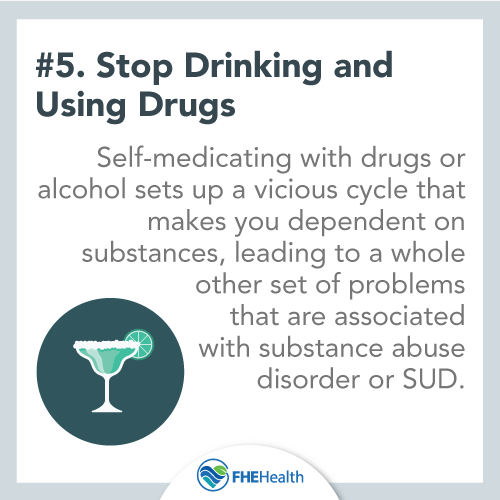 Self-medicating with drugs or alcohol sets up a vicious cycle that makes you dependent on substances, leading to a whole other set of problems that are associated with substance abuse disorder or SUD.
Self-medicating with drugs or alcohol sets up a vicious cycle that makes you dependent on substances, leading to a whole other set of problems that are associated with substance abuse disorder or SUD.
Stop Self-Medicating & Reclaim Your Well-being
If you want to learn how to stop self-medicating and develop healthy, effective ways to take control of your mental wellness, contact us here at FHE Health. Our team of compassionate mental health and addiction experts uses a combination of cutting-edge neuro-rehabilitative services, therapies and holistic treatments to help you get well.






